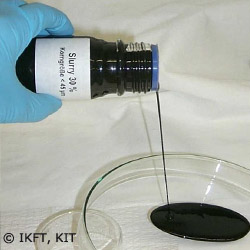Boosting biofuels for sustainable energy and environment
Europeans believe in a sustainable environment, and a way of ensuring its future is to promote and build energy resources based on residual biomass. Supporting this objective is the BIOBOOST ('Biomass-based energy intermediates boosting biofuel production') project. Set to kick off at the start of 2012, BIOBOOST will develop novel energy carriers, generating energy-rich intermediate products from biogenous residues, assess environmental compatibility and optimise logistics chains. The BIOBOOST partners will ultimately boost biomass and residues use across Europe. The project is funded under the Energy Theme of the Seventh Framework Programme (FP7) to the tune of EUR 5.1 million. Led by the Karlsruhe Institute of Technology (KIT) in Germany, the BIOBOOST team will convert residual biomass into energy carriers for the production of high-quality and engine-compatible fuels and chemicals, as well as for the generation of heat and electricity. The work will complement KIT's bioliq(R) concept, which targets the production of designer fuels for diesel and Otto engines from biogenous residues such as straw. 'Due to its broader access to usable residues and a broader spectrum of use of the energy carriers, this project fits excellently to our bioliq(R) project in Karlsruhe,' says Dr Ralph Stahl from the Institute of Catalysis Research and Technology (IKFT) at KIT. 'Both projects profit from each other in an ideal manner.' The team will use biogenous residues to produce a variety of intermediate products that are rich in energy. The researchers will also test and assess them with respect to their usability in the bioliq(R) process, for instance. Besides the BioSynCrude(R) produced by flash pyrolysis in the bioliq(R) process, BIOBOOST will focus on generating, optimising and assessing other products as well, and will evaluate the economic efficiency of the entire process. These activities will help the project partners in their quest to improve the efficiency of future biomass and residues use. The BIOBOOST consortium will tackle this issue in a series of steps. They will initially focus their efforts on concentrating the energy, as the residual biomass (e.g. straw) materialises in a spatially distributed manner and contains a tiny amount of energy. Biogenous residues are converted into coke and oil at decentralised facilities; this is performed via pyrolysis or carbonisation. The products are mixed to form energy-rich intermediate products containing up to 90% of the energy stored in the biomass. These energy carriers can be further processed after they have been moved to a central location, where they undergo large-scale use. The transport is performed in an economically efficient way. Apart from generating customised fuel like gasoline, kerosene or diesel, the BIOBOOST team will look into the manufacture of plastics and chemicals, namely propylene, methanol and ethylene. Scheduled to end in 2015, the BIOBOOST project brings together experts from Germany, Greece, the Netherlands, Austria, Poland and Finland. For more information, please visit: BIOBOOST project factsheet on CORDIS, click: here Karlsruhe Institute of Technology (KIT): http://www.kit.edu/english/
Countries
Austria, Germany, Greece, Finland, Netherlands, Poland



